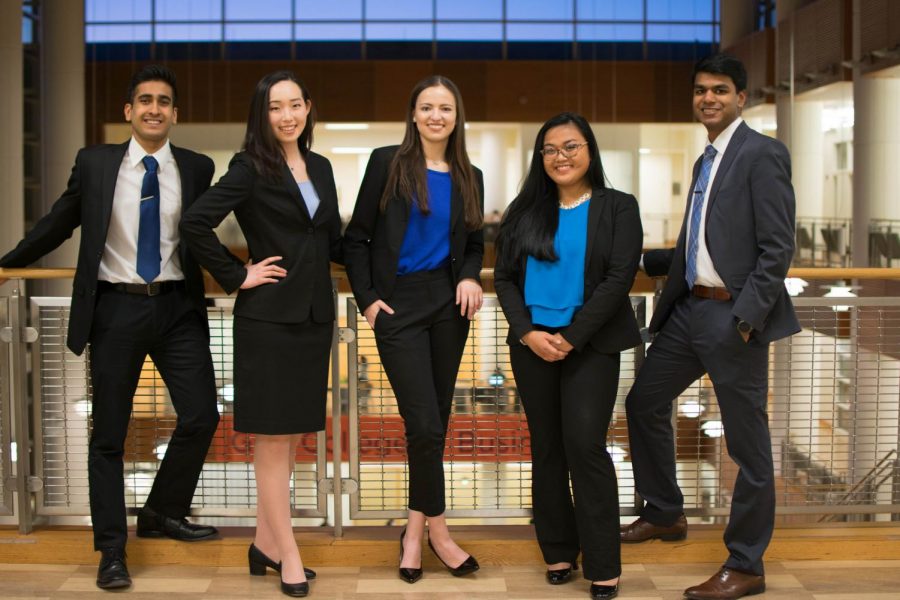Medical schools want more than a 4.00
The Executive Board of Phi Delta Epsilon poses for a group photo at the Gies College of Business Instructional Facility.
Apr 19, 2018
Not only are pre-med students oftentimes outstanding academically, they also spend their undergraduate years focusing on RSO involvement, volunteering for patient contact hours and developing other skills that allow them to stand out in the medical school application process.
Ashley Maras, junior in LAS, said she knew she needed to get involved immediately upon arriving on campus. She is the president of Phi Delta Epsilon, a pre-med fraternity on campus.
Phi Delta Epsilon is the University’s pre-med chapter of a national medical fraternity. It provides students looking to study medicine with a network of people who are on the same path. It also maintains relationships with its alumni who are currently in medical school.
Maras said that pre-med students have to determine what coursework they will need to do freshman year and plan for the next four years. Students also must try to be as involved as possible with volunteering, RSOs, leadership positions and research.
These expectations are quite demanding.
Get The Daily Illini in your inbox!
“You’re supposed to show a lot of dimension, but sometimes it’s hard because where’s the time?” Maras said.
The other members of Phi Delta Epsilon’s executive board agree with this assessment. Damee Moon, junior in LAS is the fraternity secretary. Krish Patel, junior in Business, is the vice-president of finance. Shree Patel, sophomore doing an individual plan of study in computational neurosciences, is the vice president of recruitment.
Shree Patel said that the requirements for medical school are beyond good grades. It also involves how you differentiate yourself.
“It’s a lot of juggling around,” Moon said. “You have to have all of these things in the back of your mind.”
Hollie Heintz can confirm this. Heintz works at the Career Center, primarily as the Assistant Director for Health Professions.
“None of these health professions are something that you can suddenly decide in one semesters time that you’re going to do this, it really takes a lot of preparation,” she said.
Heintz said she encourages students to everything they can to set them apart in medical school application. This can involve a number of health-related RSOs, undergraduate research, certification for EMT or nursing assistant, and volunteering or working at any of the hospitals, nursing homes, or clinics on the bus line.
It is not an easy path to follow, Maras said, but it is important to start from day one of freshman year. Heintz said that the student’s path depends on what major the student is pursuing.
She said that MCB students may come to the Career Center sophomore year looking for guidance, and would have been taking the required classes for medical school. What they need to catch up on is the extracurricular involvement. She also said some people do not realize until later that medicine is what they want to do.
“Really, I want to say it’s never too late as long as you’re willing to put in the work,” Heintz said.
If a student decides later on in their college career that they want to go to medical school, they have options. They can enroll as a non-degree to finish their medical school curriculum, and can pursue a master’s degree or a post-baccalaureate medical sciences program. Heintz said many med schools love applicants who have taken a gap year. They must also catch up on the patient contact hours and other community involvement.
It is also possible for students to bounce back from a bad grade freshman year. Krish Patel said that if you experience failure freshman or sophomore year, it is important to show that you get better and better each year.
“It depends on how you play it,” Moon said. “It can be hard to come back to being competitive.”
Maras, however, said that students can take alternative routes. She said that sometimes students will go to medical school in the Caribbean, and then they will do their residency in the states. She said that if students want to have a career in medicine, they will seek alternative routes to achieve their goals.
Additionally, students can pursue a number of medical fields that are not centered around being a physician. Individuals can become Physicians Assistants, Physical Therapists or Nurses, to name a few.
Heintz says that the Career Center hosts workshops in April for students who have applied to medical schools and are waiting for an answer. She says that these workshops help students develop a plan B so, even if they have no acceptance letter, they can still hit the ground running. She says students have a number of ways to enter the world of healthcare.
Maras considered her own back-up plan.
“If it happens, I’ll figure it out then, but until then I have to have this mindset that ‘yes, I’m going to do it,’” Maras said.






